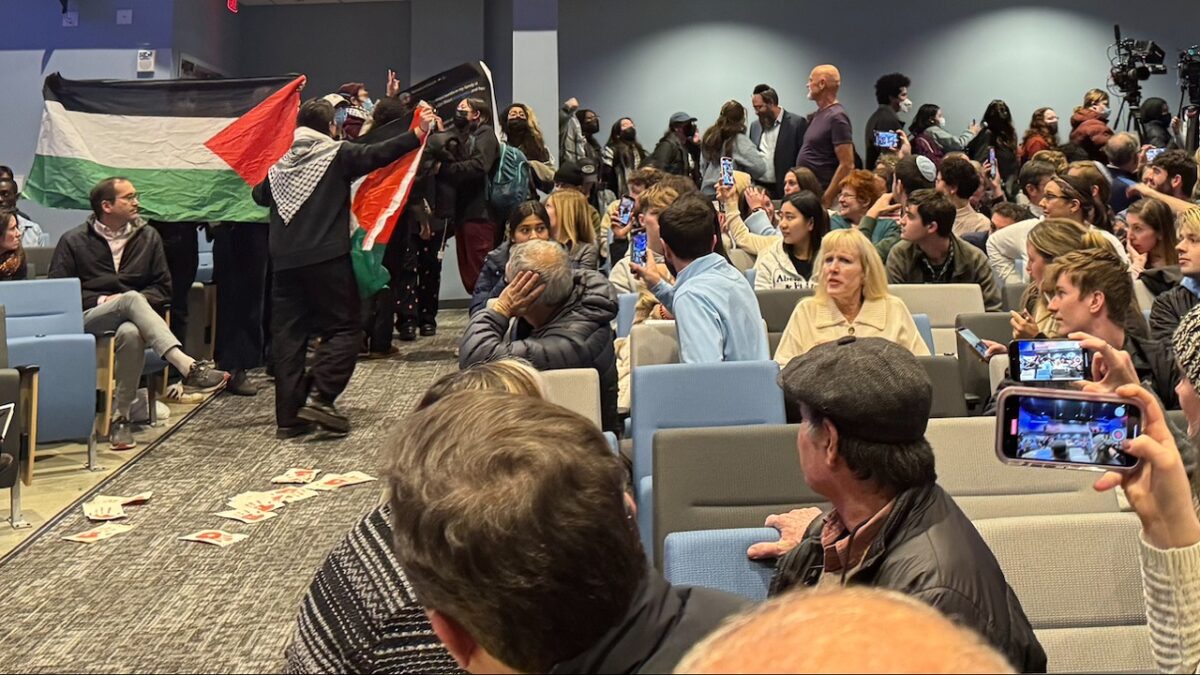Panel on Objectivity in Journalism Draws Protests
Posted on Jan. 25, 2024Two prominent journalists, one a UNC graduate and both with ties to The New York Times, led a discussion Jan. 22 on objectivity in journalism that at times was marred by chants from protestors supporting Palestine.
Frank Bruni ’86, a New York Times op-ed columnist and a television commentator, and Bari Weiss, a former New York Times op-ed staff editor who founded The Free Press and hosts its podcast Honestly, emphasized the importance of diverse perspectives in media and expressed concerns about the blurred lines between news and opinion.
The conversation began with Bruni offering a critique of The Free Press, saying it wasn’t straightforward news but rather more of Weiss’ take on issues. Weiss acknowledged its initial reactionary nature and discussed her evolving approach to providing news.
“I realized in talking to our readers that they were already massively untethered from the mainstream press in a way I did not anticipate,” said Weiss, who also was an editor at Tablet, an online magazine of Jewish culture and politics. “My sense of duty and responsibility to the reader has changed, because I realized … that I didn’t want to be replicating exactly the thing I criticize The New York Times for.”
Weiss, who was brought to The New York Times to broaden the ideological range on its op-ed pages, resigned from the paper in 2020, posting on her website a resignation letter that cited “bullying by colleagues” and an “illiberal environment.” She also called into question the paper’s integrity and politics. The letter went viral on social media.
The conversation between Weiss and Bruni, a Morehead scholar who was a student reporter for The Daily Tar Heel, was part of the Abbey Speaker Series co-sponsored by UNC’s Program for Public Discourse and Carolina Alumni.

Some protestors displayed Palestinian flags and shouted “free Palestine” and other chants. (Photo: Carolina Alumni/Cameron Hayes Fardy ’23)
About 200 people attended the event at the Frank Porter Graham Student Union, including some protestors who displayed Palestinian flags and shouted “free Palestine” and other chants, sometimes forcing Bruni and Weiss to stop speaking until the chants died down.
During the conversation, Weiss discussed her views on the Israel-Hamas War, expressing her heartbreak over civilian casualties while maintaining her stance against terrorism.
“In terms of my view of the fundamental justness of a war against a terrorist organization, against a democratic state, in which it uses rape, maiming, the kidnapping of babies as a weapon of war, of course I am against that,” Weiss said. “It’s possible to believe that the Netanyahu government is terrible and shouldn’t be in power anymore and to believe that Israel’s policies toward the Palestinians over the past decades have been oppressive.”
After Weiss’ comments, members of the group Students for Justice in Palestine walked out of the room. A statement posted on Instagram by the group said, “Bari Weiss is a right-wing US political commentator who has spent her career egregiously attempting to conflate anti-Zionism and antisemitism. In her writings on what she calls the ‘antisemitism of the left,’ which is the major focus of most of her work, she frequently reviles intersectionality, solidarity politics, anti-Zionism, pro-Palestinian voices, and any functional critique of Israel.”
Protesters waved Palestinian flags and chanted, “Bari, Bari, you can’t hide. You’re supporting genocide,” before security escorted them out of the auditorium.
Weiss said similar protests began to be more common after Oct. 7, when Hamas attacked Israel, “but it’s not surprising when we see the sort of intensity of the fever, really, that’s sweeping so many of our campuses.”
After the protest, Bruni and Weiss discussed positions they have taken during their careers that they later changed.
Weiss said there are many issues on which she doesn’t give an opinion because she doesn’t feel she has an answer or isn’t as passionate about them as others. Bruni cited his lack of tolerance toward people who live their lives differently than he and how that has changed over time.
Weiss concluded the conversation by emphasizing what she believes is the true purpose of free speech. “We have free speech in order to hopefully get to truth,” she said. “The purpose of it was not so that we could stand there screaming in each other’s faces. It is so that we could get the truth, to get to progress, to advance everyone and everything.”
— Cameron Hayes Fardy ’23
